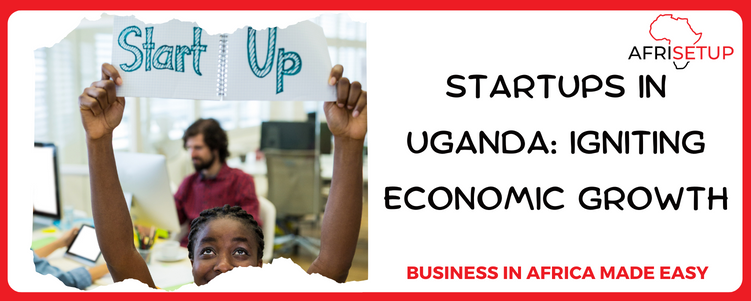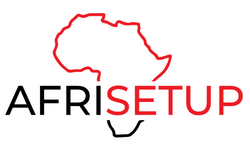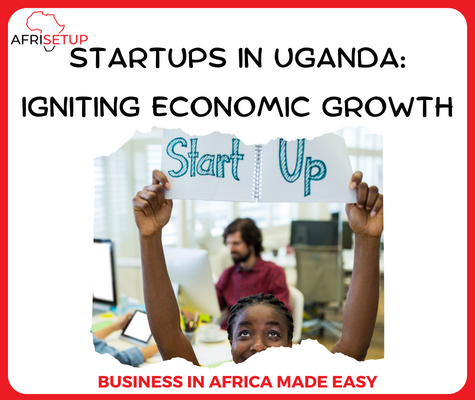- By afrisetupconsultants
- Uncategorized
- 0 Comment

Startups in Uganda – Welcome to the center of new ideas, where big dreams find chances to grow Uganda’s dynamic startup ecosystem. In the past few years, this East African country has seen a lot of people starting their own businesses, creating a strong community of startups. Whether it’s using technology to solve problems or making a positive impact on society, startups in Uganda are gaining attention both at home and around the world.
- Before we delve deep into startups in Uganda, if you are a foreign national looking to start a business in Uganda you are in the right place. At Afrisetup, we assist business owners like you in venturing into the Ugandan market by guiding them through the company registration process, ensuring a smooth experience.
Here is an overview of Uganda’s economy:
- Economic Structure: Uganda’s economy is largely agrarian, with agriculture employing a significant portion of the population. The country has diverse agricultural products, including coffee, tea, cotton, and various food crops. In recent years, there has been a growing focus on diversifying the economy.
- GDP Growth: Uganda has experienced relatively stable economic growth over the past decade. The GDP growth rate has been moderate, driven by both agricultural and non-agricultural sectors. However, the growth rate can be influenced by factors such as weather conditions, global commodity prices, and policy dynamics.
- Services Sector: The services sector, including trade, finance, and telecommunications, has been expanding. Kampala, the capital city, serves as a hub for various services and is home to a growing number of businesses and financial institutions.
- Inflation and Monetary Policy: Inflation rates in Uganda have been managed through prudent monetary policy. The Bank of Uganda plays a crucial role in implementing monetary policies to control inflation and stabilize the economy
- Agriculture: Agriculture remains a fundamental component of Uganda’s economy. The sector is characterized by small-scale subsistence farming, but efforts are being made to enhance productivity, improve value chains, and promote agribusiness.
- 6. Infrastructure Development: Uganda has been investing in infrastructure development, including roads, energy, and telecommunications. These developments aim to improve connectivity, facilitate trade, and attract foreign investment.
- Tourism Potential: Uganda has significant tourism potential with its diverse landscapes, wildlife, and cultural heritage. The tourism sector has been identified as a key area for growth, and efforts have been made to promote sustainable tourism practices.
- Foreign Aid and Investment: Uganda receives foreign aid from various international partners, and foreign direct investment (FDI) plays a role in economic development. The government has been working to create an attractive investment climate and improve ease of doing business.
- Government Initiatives: The government has implemented various initiatives to promote economic development, including poverty reduction programs, infrastructure projects, and strategies to enhance agricultural productivity.
Contact us today for more info on the Uganda Economy
Notable Startups in Uganda:
- Xeno – Xeno is an investment platform that assists millions of people across Africa in Planning, saving, and investing for any financial goal.
- My doctor – My doctor offers a thread of telemedicine centered healthcare packages including; teleconsultations, medicine deliveries, and lab sample pickups from one’s doorstep as well as an appointment-first clinic. My doctor also recently onboarded several services to help streamline and create better accessibility to healthcare in Africa.
- M-Scan – Mobile scan solutions Uganda Limited (M_SCAN) is a developer of low-cost mobile ultrasound devices that seek to reduce maternal mortality. They do this through early detection of risk factors and easy accessibility to affordable ultrasound services for use in low and middle-income families.
- Numida – Numida is a digital platform that provides convenient unsecured loans that do not require paperwork or collateral security processed within 24 hours. The people eligible for Numida loans are those that own a business, a National ID , passport or driving permit and mobile money numbers in their names.
- Kacyber – Kacyber technologies is a global transport ticketing company and BPO practitioner currently operating in Uganda and Senegal.
- Ensibuuko – Founded in 2014 in Kampala, Uganda, Ensibuuko’s platform automates data and processes payments for SACCOs and savings groups and connects them to the wider ecosystem of financial service providers including telecoms, insurance and banks.
Funding Opportunities and Organizations that support startups in Uganda
- Uganda Investment Authority (UIA) – UIA plays a key role in promoting and facilitating investment in Uganda. While it primarily focuses on larger investments, it’s worth exploring their programs and services for any potential opportunities or collaborations.
- Uganda Development Bank (UDB) – UDB provides financing solutions to various sectors, including manufacturing, agribusiness, and services. Startups may explore financing options and support from UDB for their business initiatives.
- Private Equity and Venture Capital Firms – There are private equity and venture capital firms operating in Uganda that invest in promising startups. These firms may provide both funding and mentorship. Examples include Pearl Capital Partners and InReturn Capital.
- Innovation Village – The Innovation Village is a hub for startups and entrepreneurs in Uganda. They provide support, mentorship, and networking opportunities. While not a direct funding source, being part of such ecosystems can lead to connections with potential investors.
- DFCU Investment Clubs – DFCU Bank has a program that supports investment clubs, including those focused on startups. Entrepreneurs may explore opportunities to engage with DFCU Bank for financial support.
- International Finance Corporation (IFC) – The IFC, a member of the World Bank Group, supports private sector development. They may offer financial and advisory services to startups in Uganda.
- Angel Investors and Networks – Angel investors are individuals who invest their own funds in startups. There are networks and individual investors in Uganda who actively seek investment opportunities. Building connections within the startup ecosystem can help identify potential angel investors.
- Global Innovation Fund (GIF) – The Global Innovation Fund provides funding to social enterprises, including those with innovative solutions in Uganda. They focus on projects that address global development challenges.
- Seedstars Kampala – Seedstars organizes global competitions and events for startups. Winners may receive funding and support. Seedstars Kampala is part of their global network.
- Grants and Competitions – Keep an eye on grant opportunities and startup competitions. Organizations, both local and international, often organize competitions with cash prizes or grant funding. Examples include the Anzisha Prize for young entrepreneurs and the Hult Prize Uganda.
Factors contributing to the growth of startups in Uganda.
Several factors contribute to the growth of startups in Uganda. The entrepreneurial ecosystem in the country has been evolving, and various elements play a role in fostering the development and success of startups.
Here are some key factors contributing to the growth of startups in Uganda
- Entrepreneurial Spirit – Uganda has a strong entrepreneurial spirit, with many individuals exhibiting a willingness to take risks and pursue innovative business ideas. The culture of entrepreneurship is crucial for the initiation and growth of startups.
- Supportive Ecosystem – The emergence of supportive ecosystems, including incubators, accelerators, co-working spaces, and innovation hubs, provides startups with access to mentorship, resources, and networking opportunities. These entities play a vital role in nurturing and guiding early-stage ventures.
- Government Initiatives – The Ugandan government has implemented initiatives to support entrepreneurship and innovation. Programs such as the Youth Livelihood Program and efforts by agencies like the Uganda Investment Authority aim to create an enabling environment for startups.
- Access to Funding – The availability of funding, including grants, venture capital, and angel investment, contributes significantly to startup growth. While challenges remain, there has been an increase in funding opportunities for startups in Uganda.
- Technology Adoption – The widespread adoption of technology, particularly mobile technology, has created new opportunities for startups. Fintech, healthtech, and agritech startups, for example, leverage technology to address challenges and reach a broader audience.
- Education and Training – Initiatives focused on education and training in entrepreneurship and business management contribute to the growth of startups. Training programs and educational institutions equip entrepreneurs with the skills and knowledge needed to navigate the business landscape.
- Youth Demographic – Uganda has a youthful population, and many startups are founded by young entrepreneurs. The energy, creativity, and adaptability of the youth contribute to the dynamism of the startup ecosystem.
- Market Demand – Identifying and addressing market demand is critical for startup success. Entrepreneurs who develop solutions that meet the needs of the local market, whether in agriculture, healthcare, or other sectors, are likely to experience growth.
- International Support and Collaboration – Collaboration with international organizations, NGOs, and development agencies brings expertise, funding, and exposure to Ugandan startups. Participation in global networks and competitions also opens doors for startups to gain recognition and support.
- Networking Opportunities – Networking plays a crucial role in the growth of startups. Events, conferences, and forums provide opportunities for entrepreneurs to connect with mentors, investors, and fellow founders. Networking contributes to knowledge exchange and business development
Key sectors that present opportunities for startups in Uganda
Several key sectors in Uganda offer opportunities for startups, driven by the country’s economic and social dynamics. The following are some of them:
- Agriculture and Agribusiness – Agriculture is a vital sector in Uganda, and startups are leveraging technology to improve farming practices, enhance value chains, and connect farmers to markets. Agtech solutions, such as farm management apps and agribusiness platforms, are gaining traction.
- Fintech – Fintech startups in Uganda are addressing financial inclusion challenges by providing digital payment solutions, mobile banking, and innovative financial services. The growth of mobile money services has been particularly significant.
- Healthcare and HealthTech – Startups in the healthcare sector are developing solutions to improve access to healthcare services, enhance telemedicine, and address health challenges. Mobile health apps, remote patient monitoring, and health information systems are areas of innovation.
- Renewable Energy – With a focus on sustainable development, startups in the renewable energy sector are providing solar solutions, clean cooking technologies, and off-grid power solutions. These ventures contribute to addressing energy access challenges.
- E-Commerce and Logistics – E-commerce startups are gaining popularity, offering online marketplaces, delivery services, and digital payment solutions. The growth of digital platforms is transforming the retail landscape and providing new opportunities for entrepreneurs.
- Education Technology – Education Technology startups are addressing challenges in the education sector by providing e-learning platforms, digital content, and tools for remote learning. These solutions aim to improve access to quality education.
- Tourism and Hospitality – Uganda’s rich natural and cultural heritage presents opportunities for startups in the tourism and hospitality sector. Innovative ventures offer services such as tour planning, accommodation booking, and cultural experiences.
- Manufacturing and Processing – Startups involved in manufacturing and processing are exploring opportunities in areas such as food processing, textile manufacturing, and the production of consumer goods. Local processing of agricultural products is an area of interest.
- Real Estate and Construction Tech – Real estate startups are utilizing technology to streamline property transactions, enhance property management, and provide innovative housing solutions. Construction tech ventures focus on improving construction processes and materials.
- Telecommunications and Connectivity – Startups in the telecommunications sector are contributing to improved connectivity, especially in rural areas. Innovations in mobile services, network infrastructure, and internet access are areas of interest.
- Waste Management and Recycling – Environmental concerns have led to the emergence of startups focused on waste management and recycling. These ventures aim to address environmental challenges while creating sustainable business models.
- Water and Sanitation – Startups in the water and sanitation sector are developing solutions to improve access to clean water and sanitation facilities. Water purification technologies and water management systems are areas of innovation.
- Fashion and Design – The fashion and design sector is witnessing the growth of startups that focus on local and sustainable fashion, handmade crafts, and innovative design solutions.
- Media and Entertainment – Startups in media and entertainment are creating digital content, gaming platforms, and online entertainment services. The growth of digital media has opened up new avenues for content creators.
Feel free to reach out to us for help in identifying the sector to venture in
FAQs
- What is the best business to start in Uganda? In Uganda, starting a business in the agriculture sector, such as poultry farming or fish farming, can be lucrative. The demand for locally produced poultry products and fish is consistently high, providing opportunities for growth. Additionally, venturing into the renewable energy sector, like solar panel installation or biogas production, aligns with the country’s focus on sustainable development. Finally, establishing a small-scale retail business, such as a grocery store or boutique, can cater to the local community’s daily needs, ensuring a steady customer base.
- Is Uganda a good place to start a business? Uganda is a great place for businesses looking for opportunities in East Africa. This is because of its strategic location, plenty of natural resources, a growing number of consumers, and government policies that support business.
- What is the startup ecosystem in Uganda? Kampala boasts Uganda’s top startup ecosystem, securing the 4th position in Eastern Africa. With a population ranging from 1 to 2 million people, Kampala holds the 390th spot globally. The city has seen notable success stories in startups, such as Tugende.
- How much do I need to start a business in Uganda? The cost needed to start a business in Uganda varies widely depending on the nature and scale of the venture. Call Us today to get the actual amount.
- What is the startup policy in Uganda? To be considered a startup in Uganda, certain requirements need to be met. These include having a temporary management setup, dedicating a part of the budget to research and development, being predominantly owned by Ugandans, and being officially registered in Uganda.
Conclusion
In conclusion, startups in Uganda are not just businesses; they are drivers of change, innovation, and economic prosperity. The challenges they face are met with resilience and creativity, shaping a future where Ugandan startups continue to thrive and make a lasting impact. Contact us for more information.

